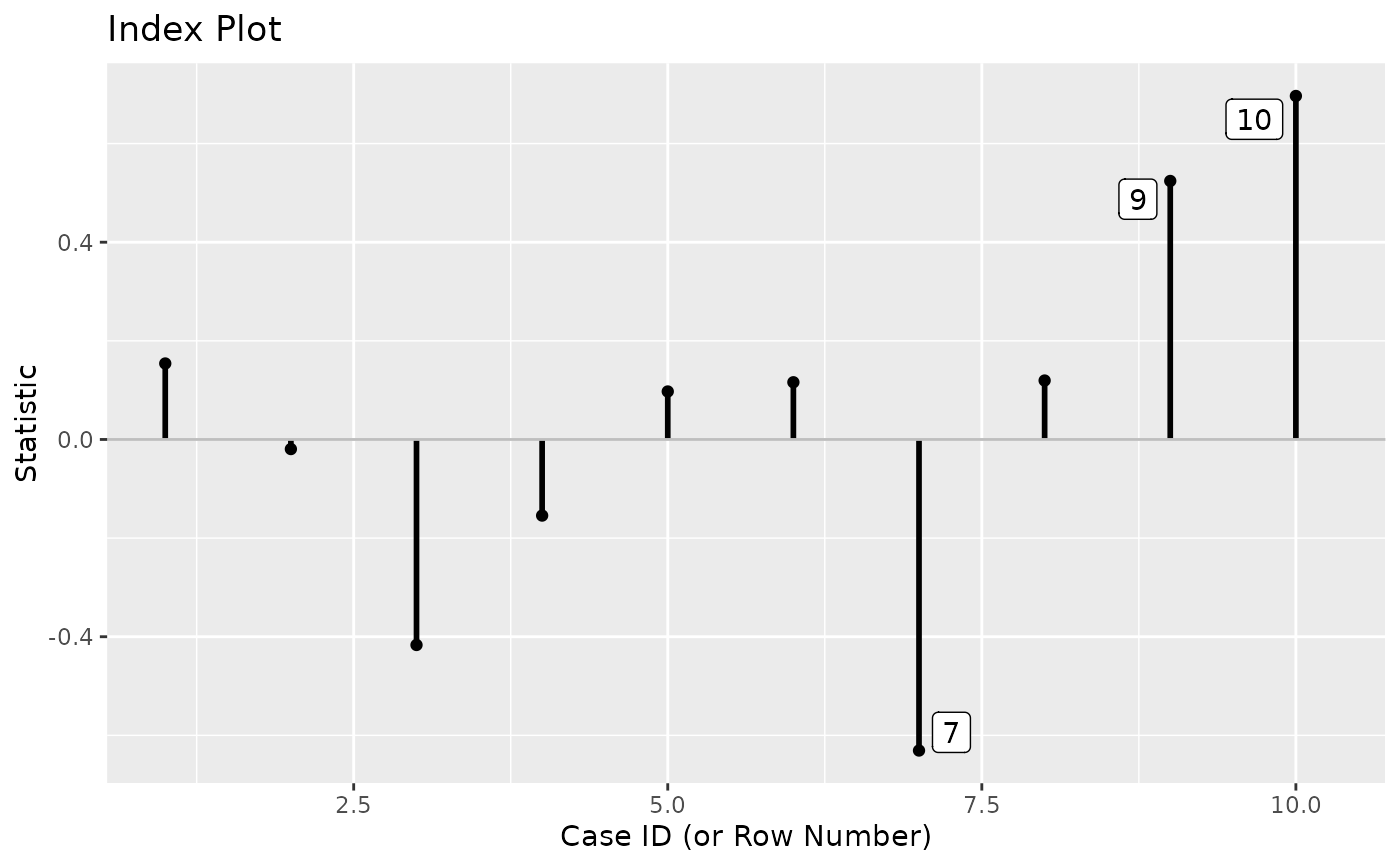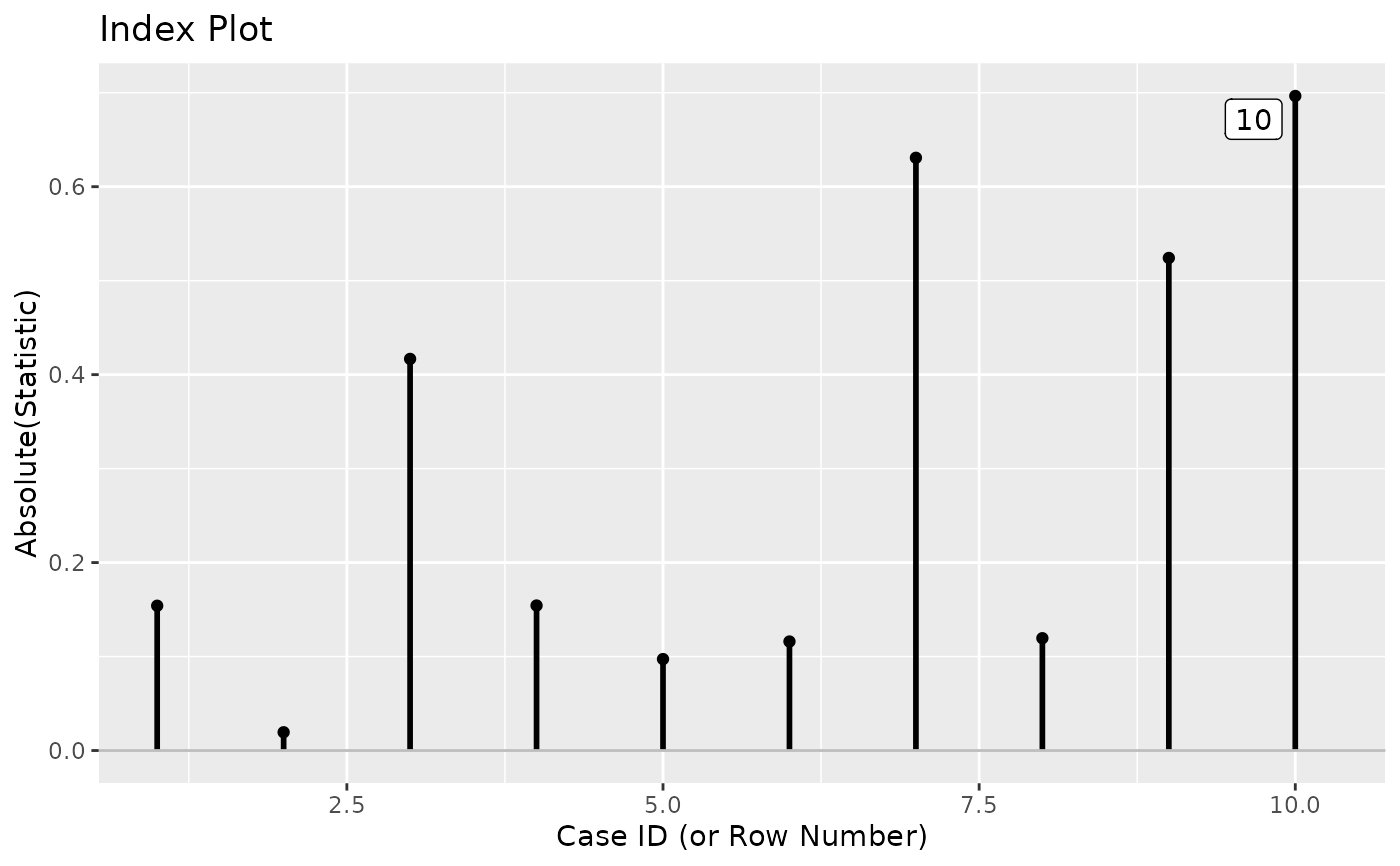A generic index plot function for plotting values of a column # in a matrix.
Arguments
- object
A matrix-like object, such as the output from
influence_stat(),est_change(),est_change_raw(), and their counterparts for the approximate approach.- column
String. The column name of the values to be plotted.
- plot_title
The title of the plot. Default is
"Index Plot".- x_label
The Label for the vertical axis, for the value of
column. Default isNULL. IfNULL, then the label is changed to"Statistic"ifabsoluteisFALSE, and"Absolute(Statistics)"ifabsoluteisTRUE.- cutoff_x_low
Cases with values smaller than this value will be labeled. A cutoff line will be drawn at this value. Default is
NULL. IfNULL, no cutoff line will be drawn for this value.- cutoff_x_high
Cases with values larger than this value will be labeled. A cutoff line will be drawn at this value. Default is
NULL. IfNULL, no cutoff line will be drawn for this value.- largest_x
The number of cases with the largest absolute value on `column“ to be labelled. Default is 1. If not an integer, it will be rounded to the nearest integer.
- absolute
Whether absolute values will be plotted. Useful when cases are to be compared on magnitude, ignoring sign. Default is
FALSE.- point_aes
A named list of arguments to be passed to
ggplot2::geom_point()to modify how to draw the points. Default islist()and internal default settings will be used.- vline_aes
A named list of arguments to be passed to
ggplot2::geom_segment()to modify how to draw the line for each case in the index plot. Default islist()and internal default settings will be used.- hline_aes
A named list of arguments to be passed to
ggplot2::geom_hline()to modify how to draw the horizontal line for zero case influence. Default islist()and internal default settings will be used.- cutoff_line_aes
A named list of arguments to be passed to
ggplot2::geom_hline()to modify how to draw the line for user cutoff values. Default islist()and internal default settings will be used.- case_label_aes
A named list of arguments to be passed to
ggrepel::geom_label_repel()to modify how to draw the labels for cases marked (based on arguments such ascutoff_x_loworlargest_x). Default islist()and internal default settings will be used.
Value
A ggplot2 plot. Plotted by
default. If assigned to a variable
or called inside a function, it will
not be plotted. Use plot() to
plot it.
Details
This index plot function is for plotting any measure of influence or extremeness in a matrix. It can be used for measures not supported with other functions.
Like functions such as gcd_plot()
and est_change_plot(), it supports
labelling cases based on the values
on the selected measure
(originaL values or absolute values).
Users can also plot cases based on the absolute values. This is useful when cases are to be compared on magnitude, ignoring the sign.
Author
Shu Fai Cheung https://orcid.org/0000-0002-9871-9448.
Examples
library(lavaan)
dat <- pa_dat
# The model
mod <-
"
m1 ~ a1 * iv1 + a2 * iv2
dv ~ b * m1
a1b := a1 * b
a2b := a2 * b
"
# Fit the model
fit <- lavaan::sem(mod, dat)
summary(fit)
#> lavaan 0.6-19 ended normally after 1 iteration
#>
#> Estimator ML
#> Optimization method NLMINB
#> Number of model parameters 5
#>
#> Number of observations 100
#>
#> Model Test User Model:
#>
#> Test statistic 6.711
#> Degrees of freedom 2
#> P-value (Chi-square) 0.035
#>
#> Parameter Estimates:
#>
#> Standard errors Standard
#> Information Expected
#> Information saturated (h1) model Structured
#>
#> Regressions:
#> Estimate Std.Err z-value P(>|z|)
#> m1 ~
#> iv1 (a1) 0.215 0.106 2.036 0.042
#> iv2 (a2) 0.522 0.099 5.253 0.000
#> dv ~
#> m1 (b) 0.517 0.106 4.895 0.000
#>
#> Variances:
#> Estimate Std.Err z-value P(>|z|)
#> .m1 0.903 0.128 7.071 0.000
#> .dv 1.321 0.187 7.071 0.000
#>
#> Defined Parameters:
#> Estimate Std.Err z-value P(>|z|)
#> a1b 0.111 0.059 1.880 0.060
#> a2b 0.270 0.075 3.581 0.000
#>
# --- Leave-One-Out Approach
# Fit the model n times. Each time with one case removed.
# For illustration, do this only for selected cases.
fit_rerun <- lavaan_rerun(fit, parallel = FALSE,
to_rerun = 1:10)
#> The expected CPU time is 0.42 second(s).
#> Could be faster if run in parallel.
# Get all default influence stats
out <- influence_stat(fit_rerun)
# Plot case influence on chi-square. Label the 3 cases with the influence.
index_plot(out, "chisq", largest_x = 3)
 # Plot absolute case influence on chi-square.
index_plot(out, "chisq", absolute = TRUE)
# Plot absolute case influence on chi-square.
index_plot(out, "chisq", absolute = TRUE)

